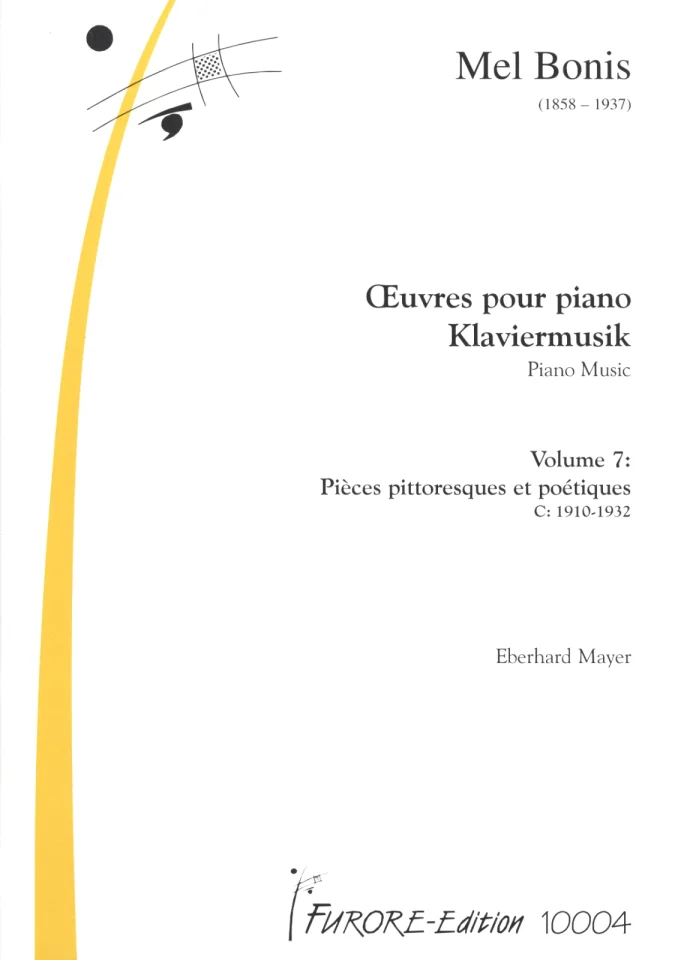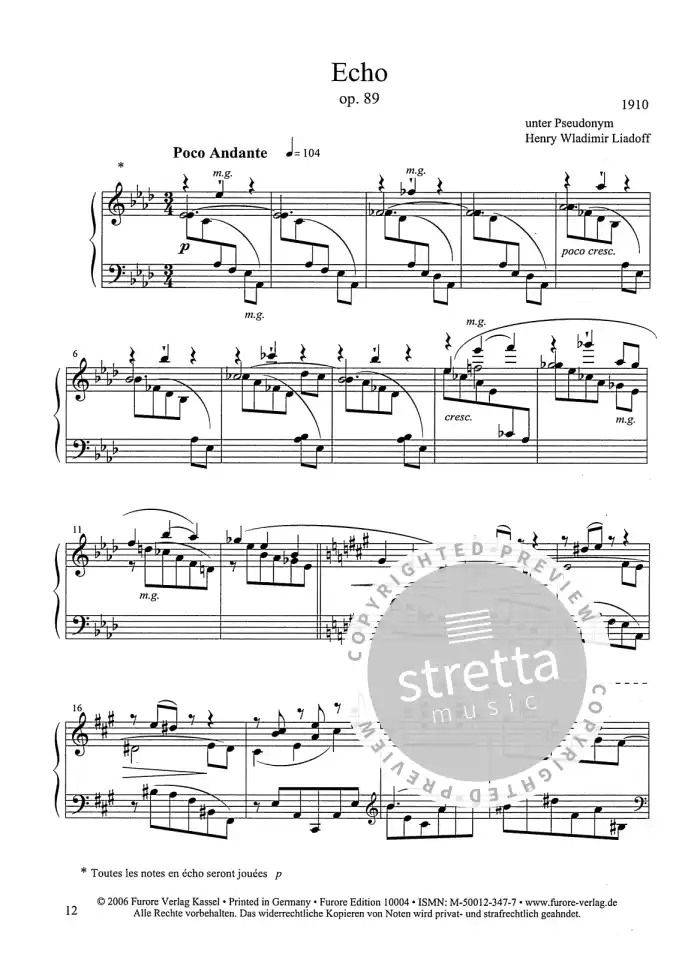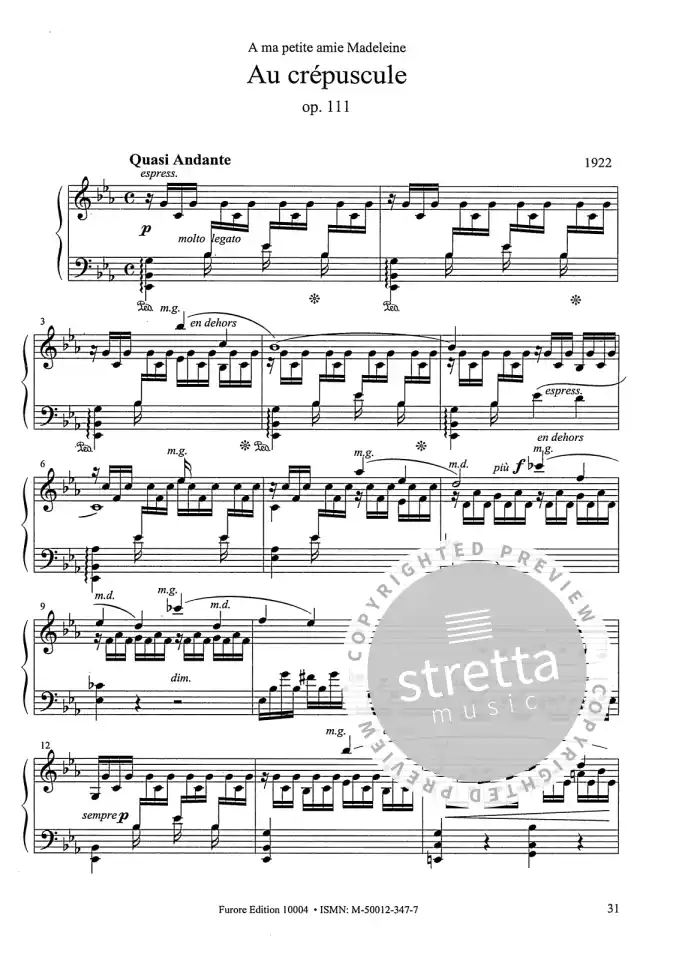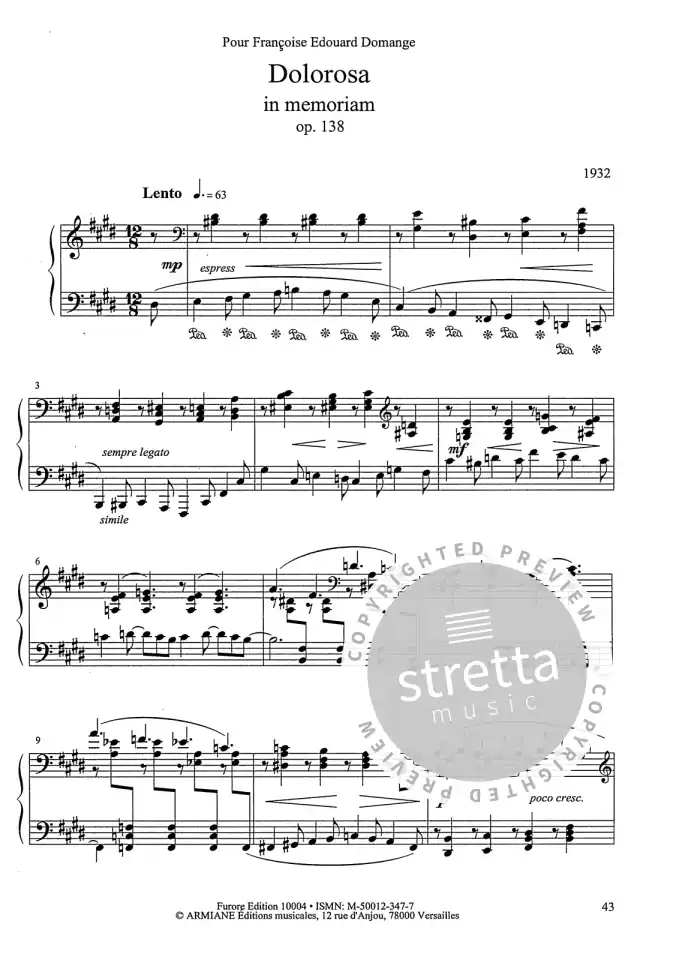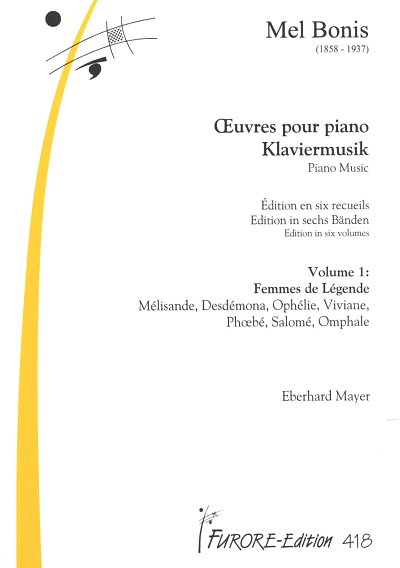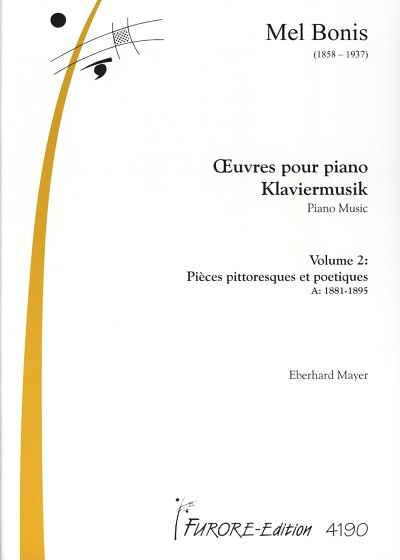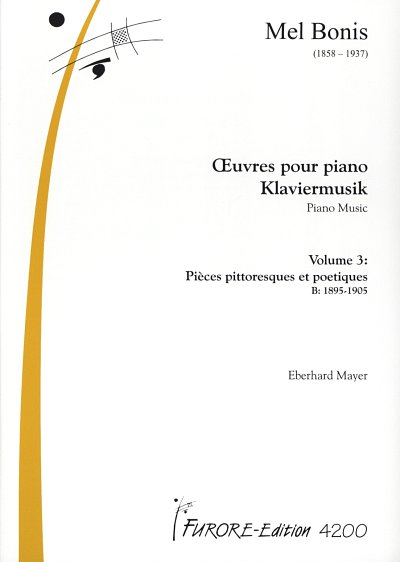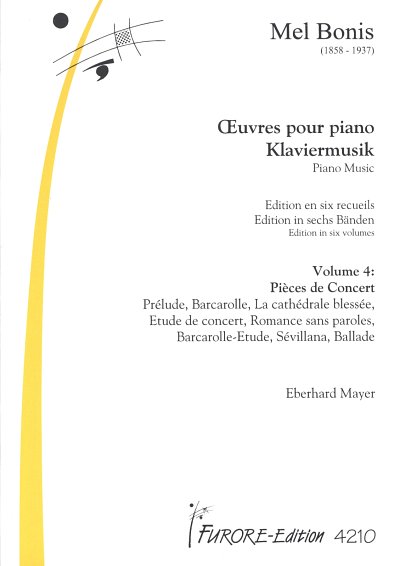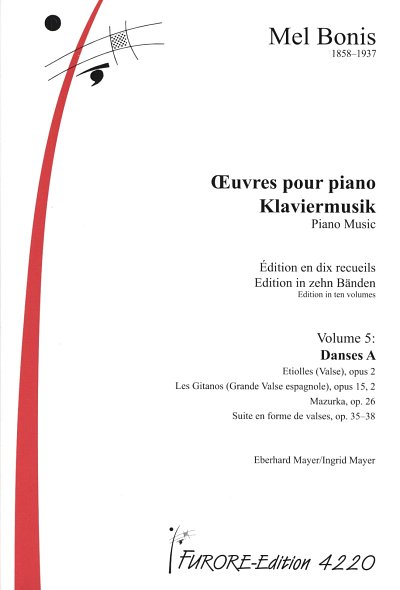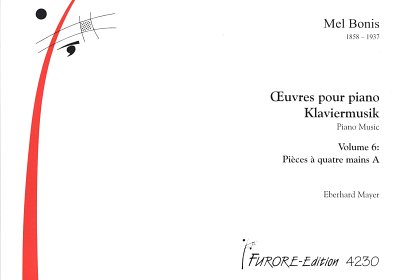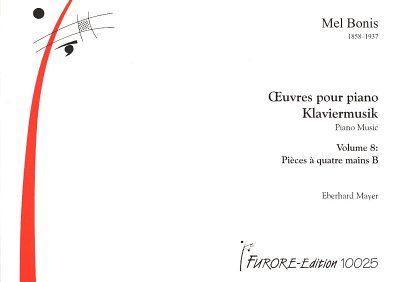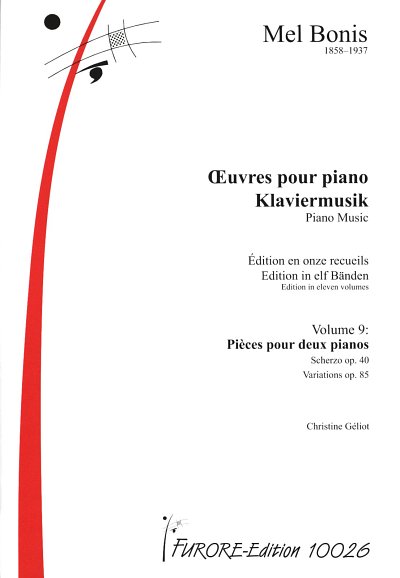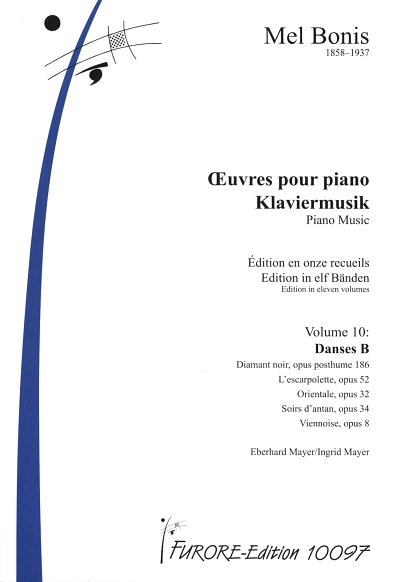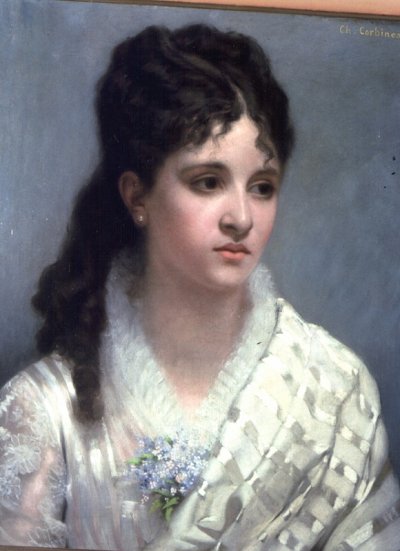This heading includes pieces of a descriptive and poetic character which differ from the “Femmes de légende” and the “Pièces de concert” in terms of range and degree of difficulty. However, they are not easy to perform and require great empathy.
Due to their large number they have been divided into two volumes, the first of which contains those composed before 1900, the second those composed after 1900. The third volume of Pièces pittoresques et poétiques contains eight separate pieces, which have been com-posed after 1910, and the « Cinq pièces musicales », published by Maurice Sénart in Paris in 1929:
Echo (op. 89) and Narcisse (op. 90): The source of inspiration for both pieces is an episode in Greek mythology: the unrequited love of the nymph Echo for Narcissus, who had fallen in love with his own reflection. “Echo” and “Narcisse” were published by Mel Bonis in 1910 with Maurice Sénart under the pseudonym Henry Wladimir Liadoff – perhaps alluding to her Russian contemporary Anatol Liadow. Her recourse to a pseudonym is probably an expression of the self-doubts which plagued her at that time.
The echo effect achieved in “Echo” by the repetition of individual notes and phrases tansposed by an oc-tave runs throughout the entire piece. The harmoni-cally very pleasing, but complex structure, the mod-erate tempo and the “flowing” character make “Echo” both aesthetically appealing and pleasant to play.
“Narcisse” is a less easily accessible piece due to the complexity of its musical development whose har-monic surprises and constant changes of metre de-mand both empathy and high technical standards on the part of the performer.
L’ange gardien („The Guardian Angel“) op. 102, posthumous: This piece, which exists only as a manuscript was obviously not intended for publication. The three verses preceding it as a motto (“Descending to caress / Fleeting touch of a white wing / It is your guardian angel”) were probably written by Mel Bonis herself and contribute to the lively and, at the same time, tender mood of the piece. “L’ange gardien” was first published in 2001 by Armiane. Lasting almost three minutes, the piece has to be played sensitively, but is not highly demanding in technical terms.
Il pleut („It is raining“) op. 102: It is quite obvious that “Il pleut”, composed in 1913, is a pleasurable reminiscence of a piece written ten years before by Debussy, “Jardins sous la pluie” (“Gardens in the Rain”). This assumption is sup-ported by astonishing parallels in structure and con-tent: for example, the use of a folk-song – “Il était une bergère” by Mel Bonis and of “Dodo l’enfant do” by Debussy – at the centre of this short piece. “Il pleut” was published by Maurice Sénart as part of his collection “La Musique contemporaine” in 1913. It is dedicated to her daughter Madeleine, who was an excellent amateur pianist.
Au crépuscule („At dusk“) op. 111: Like the previous piece, Mel Bonis dedicated this to her daughter Madeleine. The manuscript contains the dedication: “To my little friend Madeleine” along with the year of composition, 1922. It was published by Hamelle in Paris in 1923. The melody is divided between both hands which alternate in playing the melody and accompaniment, thus representing the changing shades of colour in the evening sky.
A final flicker of light from the sun is intimated by a poco a poco crescendo ed animato and leads to a piano subito that precedes the arpeggiating return to the opening key and mood. Lasting a good three minutes, this piece is of medium difficulty.
Près du moulin („By the mill“) op. 115: In “Près du moulin” one can imagine hearing the rattling of the mill-wheel and, particularly in the arpeggiating middle section, one feels transported to a landscape presented in an impressionistic manner. The piece was first published by Maurice Sénart in Paris in 1925. It lasts about 2½ minutes and is un-problematic in terms of performance.
Ariel op. 129, posthumous: “Ariel” is one of the pieces that clearly reflect the doubts affecting the composer during the creative process: several attempts in different keys and tempos were made and discarded again, and for the eventual-ity of publication Bonis had chosen a pseudonym (Melás Benissouvski – a joking distortion of her own name). In the end, the last manuscript, dated 1925 and on which this edition is based, was left lying in a drawer. The piece is full of charm, but is not easy to play.
Dolorosa op. 138, posthumous: Mel Bonis wrote this piece soon after the untimely death of her son Edouard, who died in tragic circum-stances during a business trip to Egypt in 1932. She dedicated it to her daughter-in-law, the young widow Françoise Domange. The long melodic strands with delayed chords give expression to her deep pain at the loss of her beloved son. „Dolorosa“ was published by Armiane in 2001.
Cinq pièces pour piano à Madeleine Quinet: Some 40 years after “Cinq pièces musicales” pub-lished by Durdilly and 30 years after “Cinq pièces” published by Leduc (see Pièces pittoresques et poé-tiques A), a new cycle of five piano pieces appeared in 1929, this time published by Maurice Sénart in Paris. They are short, poetic pieces. On the title page of the manuscript Mel Bonis noted in pencil: “Cinq petites pièces pour piano (pas très faciles)” (“not very easy”). Once again, this work is dedicated to Made-leine, but this time under her married name: “A Madeleine Quinet”.
1) Une flûte soupire („A flute is sighing“) op. 117: This first piece is a pastorale, written very much in the spirit of Impressionism, whose enticing and in-terwoven melody fit perfectly with the sound patterns of the flute, just as the motto – a sentence written by Victor Hugo – noted on the manuscript of 1928 an-nounces: "Viens, une flûte invisible soupire dans les vergers." (“Come, an invisible flute is sighing in the gardens.”). In 1936 a version for flute and piano did in fact appear, published by Maurice Sénart, and is the basis for the current edition of the piece published by the flute specialists Edition Kossack.
2) Berceuse triste („Sad lullaby“) op. 118: Using the simplest of means – a simple mostalgic motif, a gentle rocking and a minor-major modulation – the composer succeeds in creating a minor master-piece with a prevailing mood of melancholy.
3) Boston valse ou valse lente op. 119: In the twenties, with the Charleston setting the tone, although Mel Bonis was by then no longer very open to fashionable influences, she allowed herself to be seduced by the new rhythms that were coming over from America at that time. This can be seen in par-ticular in passages from her second piano quartet and in this “Boston valse” which reproduces the charm, the youthfulness and the joie de vivre of the day with parodistic humour.
4) Agitato op. 120: Lasting not even one minute, this piece, which con-stantly vacillates between minor and major and – despite the surprising instruction “allegretto” – re-quires a rapid tempo, is a unified whole. It places great pianistic demands upon the performer.
5) Cloches lointaines („Distant bells“) op. 121: The cycle ends with a piece that reveals the com-poser’s proximity to Ravel, but also shows her predi-lection for quiet endings (cf. “Suite orientale” and “Scènes de la forêt”). The piece owes its special char-acter not only to the sophisticated harmony but above all to the pianissimo passages in the opening and closing parts, by means of which the effect of bells pealing in the distance is to be achieved by skilful use of the pedals.
